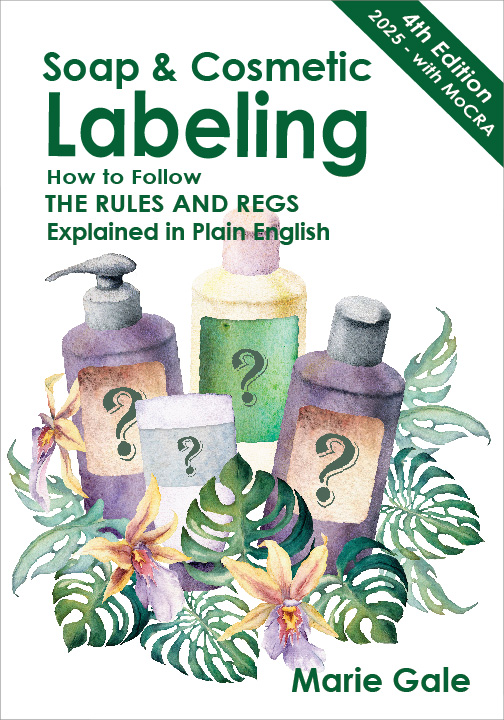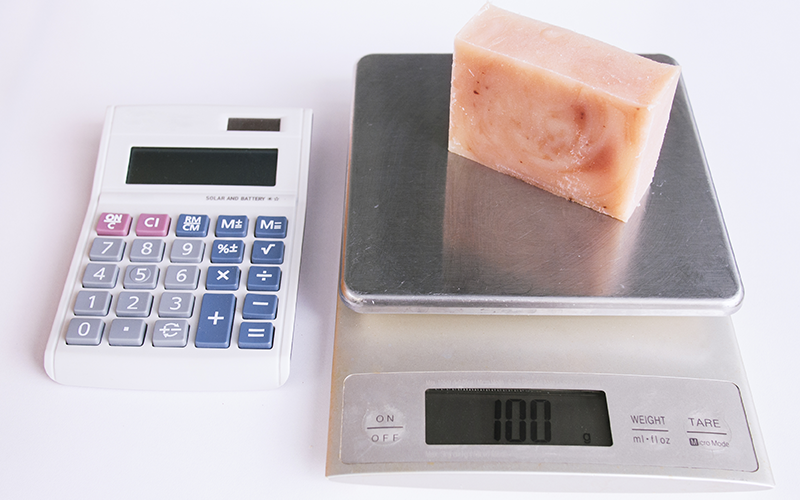As you can probably imagine, I am on a lot of Facebook groups. I see many, many pictures of labeled soap and cosmetics. People send me soap labels to look at; they ask for my advice; I have a label review service. The net result is that I see a HUGE number of labels.
Why do I mention that? Because close to HALF of the labels I see don’t include the net weight.
Net Content Required
The net contents of the product isn’t just a good idea. It is a key piece of information that is required on every product.
- The net contents (in weight or volume as appropriate) is required on the front panel of the label.
- It must be in the bottom 30% of the label (when the product is standing up facing the consumer).
- It must be parallel to the bottom of the product.
- There must be at about 3/16″ empty space above and below the net weight (exact amount depends on the type used).
- It must be 1/8 inch high, measuring the height of a lower-case “o” in the font used.1
Awkward, Inconvenient, and Big
The required type size and placement is not very pretty. It messes with the design of the label. It’s often inconvenient. It takes up a lot of room.
All true. But just because you don’t like it doesn’t mean you can just skip the regulations.
What Regulations?
The fact that the net weight must be placed on the front panel is in law, as part of the Fair Packaging and Labeling Act (FPLA).
The FDA has regulations to implement the FPLA that cover cosmetics and soap that is not exempt from the definition of a cosmetic.2
The Federal Trade Commission has and enforces the net contents regulations from the FPLA for most products that aren’t cosmetics, drugs or food).3
In addition, most states have adopted some or all of the Uniform Packaging and Labeling Guidelines, which have the same requirements.
Why is it important?
The stated intention of the Fair Packaging and Labeling Act is to make is easy for consumers to make value comparisons between products in order to make informed purchase decisions.
If two bars of soap are each $7.50, but one is 4 oz and one is 8 oz, the consumer needs to have that information in order to make an informed purchase decision. The 8 oz bar may be cheaper by the ounce, but the 4 ounce bar may have other value in the ingredients or even just in the perceived value because of the packaging. The cost per ounce is not the only factor in determining value, but it is an important factor.
NOTE: Soap loses weight over time due to water evaporation. If you have trouble calculating the net weight of your soap, see Calculating the Net Weight of Soap (Part 1) and Part 2
Bottom Line
By not putting the net weight on your products, you are not only violating the law AND existing federal and state regulations, you are also doing a disservice to your customer.
You may not like putting the net weight on the front of the label, but (as they say in the military) “Suck it up, buttercup!”
Do what’s right for yourself, for your customers, and so the rest of us don’t end up with more regulations to enforce putting the net weight where it belongs.

Shameless plug!
To really be able to create your own labels that comply with the regulations, get my book from Amazon and use it.
4th Edition – Released March 5, 2025!!!
Or order directly from me (and get a signed copy)!


Leave a Reply